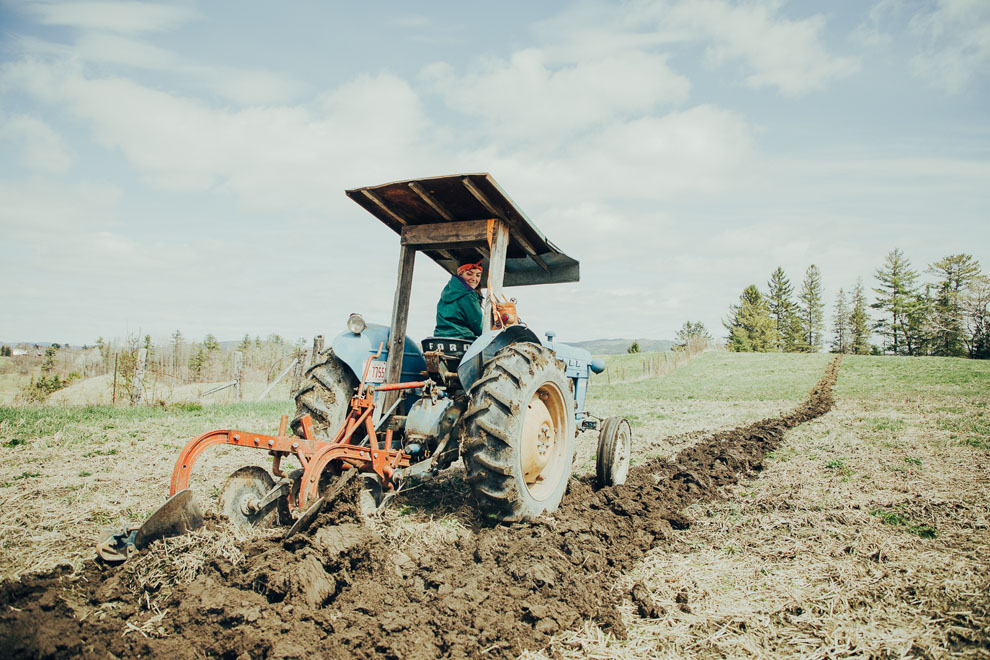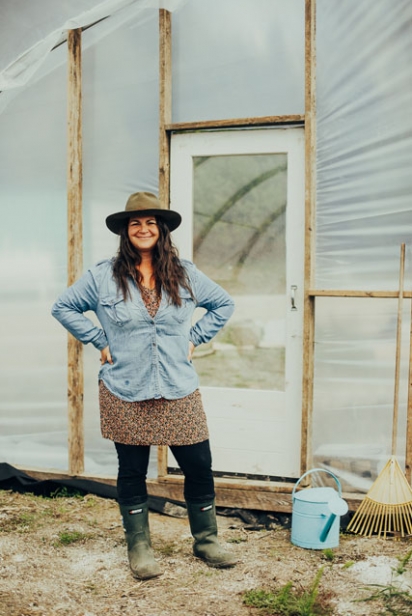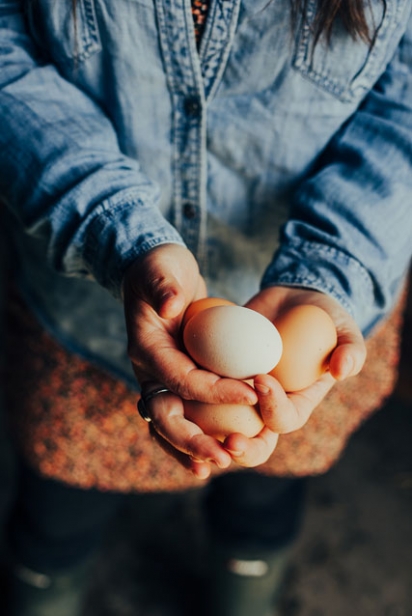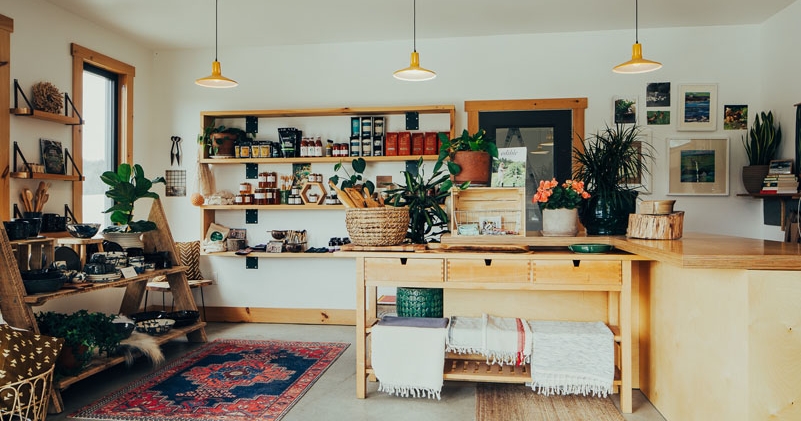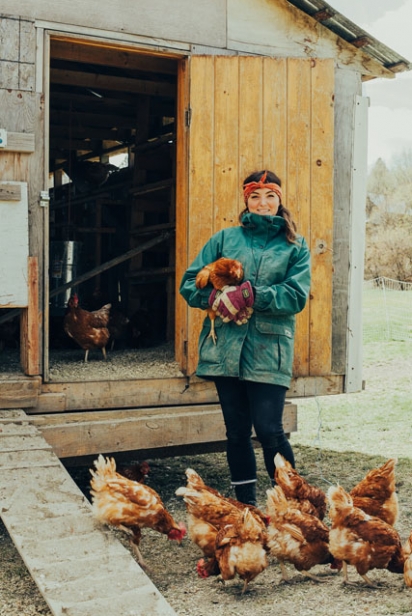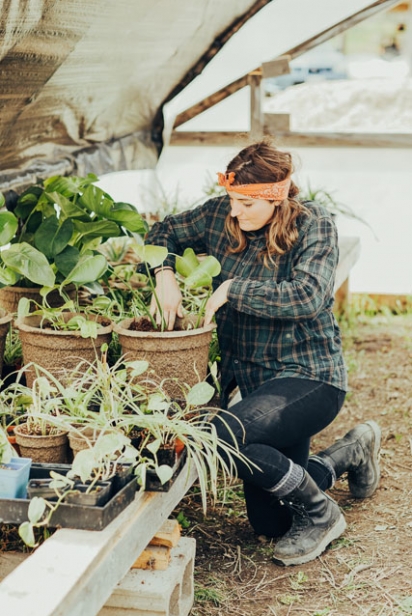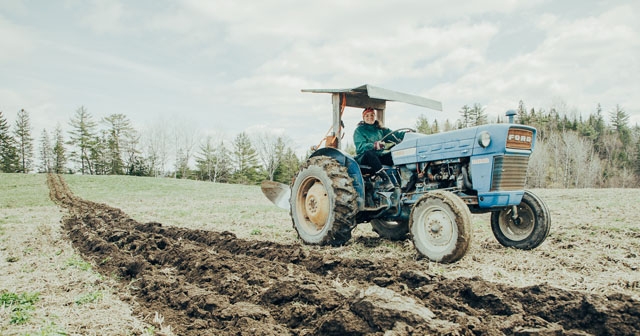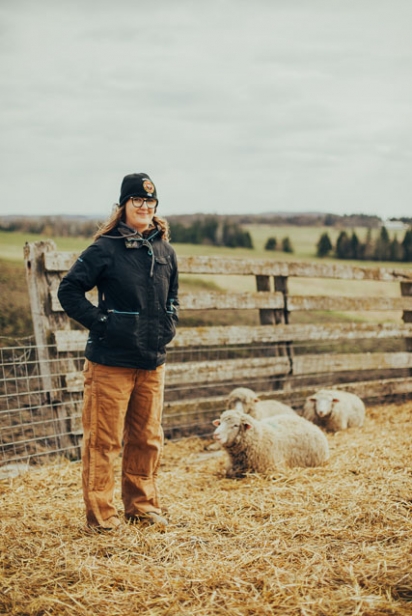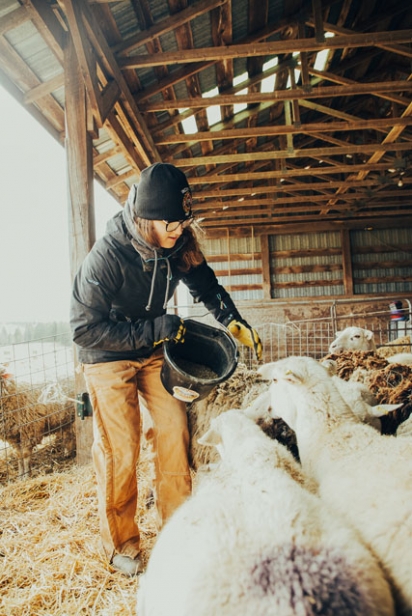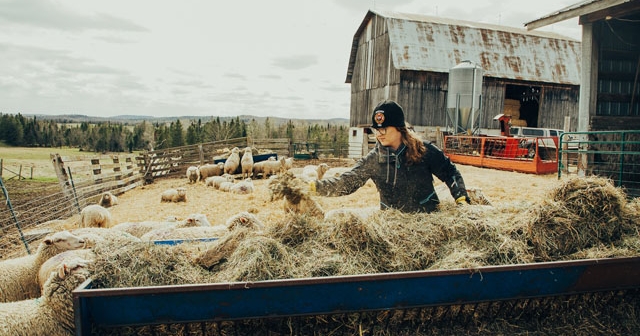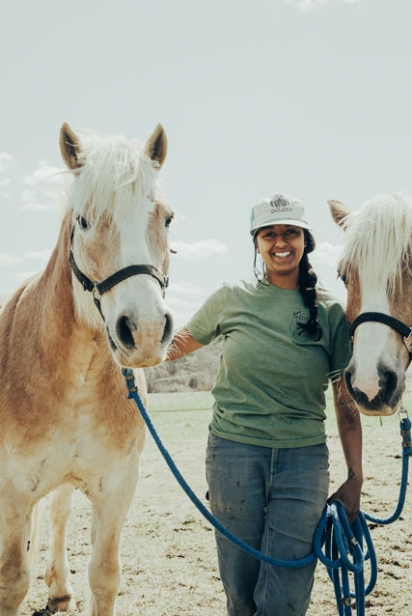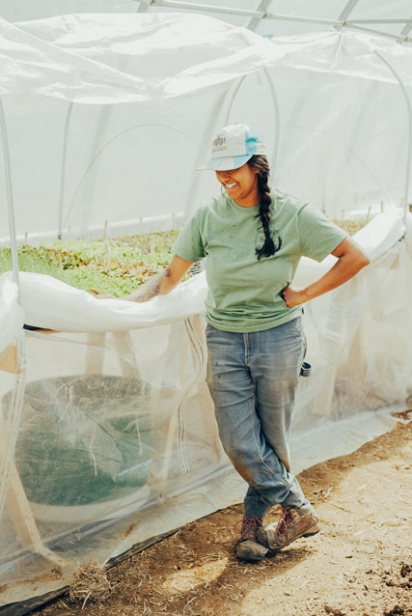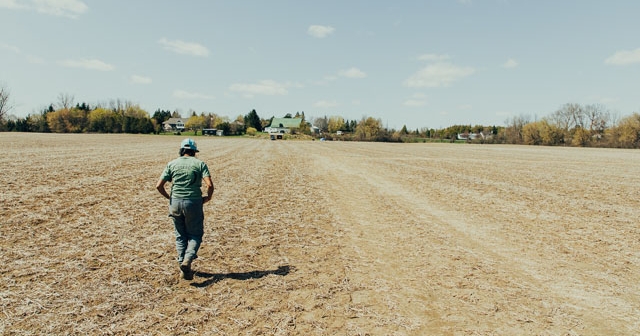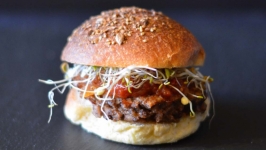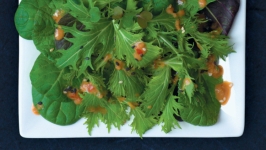'The Future is Female Farmers'
You’d be correct if a casual glance around the faces at your local farmers’ market left you with the impression that many farmers are female. The most recent census figures from 2016 showed that 28.7 per cent of farmers across Canada were female. That’s about 77,800 of them.
And while there are fewer female farmers found leading the industrial-scale operations, that’s more than made up for by the preponderance of women running smaller farms, the kind of women we talked to for this article; those forging deep ties to their land and their communities.
'A spot to make your heart sing'
Christa de Benedetti has a lifelong history with food. Now, to tie it all together, she’s finally found her farm. It’s a journey that has taken her from Alexandria, to the east of Ottawa where she grew up in a rural community, to the countryside in Low, just to the north of Wakefield, Que.
De Benedetti took ownership of Boreal Farm in November 2020. Her log-cabin home sits atop a small hill that looks out over the 115-acre property, a mix of open grassland, shaded woods and rocky outcrops, with an on-site farm-store and bucket-loads of potential. It’s a spot to make your heart sing.
De Benedetti wasted no time getting to work. She took possession of the property at the beginning of November, started working on branding immediately and opened the farm store a mere six weeks later, just in time for Christmas. The store was packed with eggs from her flock of 70 chickens and mouth-watering homemade treats, such as mini puff pastry hand pies stuffed with caramelized onions and goat cheese, Meyer lemon cream scones, frittatas, local honey, beeswax candles, preserves, soaps, slippers, cards, pottery, granola and maple syrup. “When you shop here, you’re supporting all the artists and makers in our community,” she explains.
But De Benedetti has only just started. She has big plans for Boreal Farm, which speak to her lifelong ties to food and her vision as a new farmer. “This is the culmination of 25 years in the food and hospitality industry and a dream that began with British food writer Hugh Fearnley-Whittingstall when I saw his farm and how it healed people,” De Benedetti says. “At that time a seed just sprouted in me and now I want to create a safe place for community, to teach lessons of sustainable living, regenerative agriculture, restore the land and foster connection between people and the landscape.”
To that end, De Benedetti, whose earliest food memory is pitting olives in the kitchen with her nonna, is hosting a series of workshops that speak to these themes. On the menu is Grow Your Own Food, Composting, Food is Medicine, Fermenting, Bee- Keeping, Healing Salves and Tinctures and Soap-Making, among others. She has plans for yoga and brunch on the store’s newly built deck, as well as occasional whole lamb and hog roasts so that people who come to shop and visit the farm can enjoy this most direct farm-to-table style of eating while there.
De Benedetti started out aged 17 as a prep cook in a local pub. Then, quite by accident, she started a catering business with her sister, the founder and former owner of the much-loved Quirky Carrot in Alexandria. “Someone asked us if we’d ever consider catering,” she recalls, “and we simply went job to job. We never did any marketing and we were handed on from one client to the next.” In her 20s, she worked on three farms and over the years, De Benedetti has owned her own food retail business and spent eight years working as a cook at Les Fougères restaurant in Chelsea.
Now, her plans include farm stays, as well as the restaurant that will soon complement the farm store. A sunny dining deck overlooks the half-acre of land where the food that De Benedetti will transform into mouth-watering treats, will grow. Local farmers Tom Gibbs and Abbi Spencer from Ferme Reservoir, just a stone’s throw away, will cultivate the produce, as well as a cutting garden for flowers and pick-your-own pumpkins come fall.
“I have a flower problem,” De Benedetti confesses, as she shows the very long list of all the flowers she wants to grow. “I’m going to produce herbal and perennial teas here too, as well as healing salves and I’ll have a pickle-ry section in the store.”
Somehow, none of this would be complete without really good bread. Bread is that most basic of foods and one loaded with the symbolism of community. Each week, De Benedetti’s father Fred, a retired baker who owned Fred’s Bread in Kingston, delivers 40 loaves of organic sourdough. Come summer and the opening of the Boreal Farm’s deck, customers will be able to break bread or take it home to nourish their families.
Homesteading and microbrewing
Ferme Thuya was born of a desire to leave the city and live close to the land. Owner, Anne-Marie Laplante, 29, bought the 130-acre farm just 15 minutes north of Wakefield, Que., hidden down a dead-end dirt road nearly four years ago, with the intention of homesteading, ultimately raising chickens, beef, pork and growing vegetables to sell.
She has been working hard to improve the land, sowing cover crops such as oats and peas to increase soil fertility, while raising a couple of pigs for personal consumption as well as organic chickens, eggs and vegetables for sale through her small farm store, which opened in 2020. A pair of beef cattle will arrive this season. “I like the ecosystem with the animals,” she explains, “and the way they fertilize the soil naturally.”
All the while, she has been working as a graphic designer through her company Flourish Creative; she designed the branding for Christa De Benedetti at Boreal Farm. She has also been selling pure essential oils made by dõTERRA, a company in Utah.
“This company shares my values and wellness goals, with their effort to partner with small farms, pay a living wage, produce zero waste and make sustainable living part of their company.” Laplante uses the oils in a diffuser, for pain management and directly in her food.
“Essential oils can be great for reducing inflammation,” she explains, “and I use very small amounts in my food, such as lime oil in a tomato-cilantro salad and oregano oil in spaghetti sauce, cinnamon oil with oatmeal and in smoothies.”
But now, Laplante has grand plans. She intends to open a microbrewery called Brasserie en Forêt in her century-old barn, growing the hops and barley for the beer on-site. Plans are afoot for a small commercial kitchen to serve food alongside the artisanal beers. And of course, there will be the farm store, selling eggs, chickens, house plants and vegetables from her farm and that of Ferme Reservoir owners Tom Gibbs and Abbi Spencer, who rent a parcel of land on the farm.
Laplante grew up in Orleans, “but I didn’t like it there. I always knew I wanted to move out to a farm and live with the seasons and the elements,” she recalls. She has worked her way around the world WWOOFing (worldwide opportunities on organic farms), landing at farms in Portugal, France and Nicaragua, before returning to the capital region to work at nearby Juniper Farm, for five years.
Thuya, which is the botanical name for the cedar family of trees, was born of a love of wood. Her partner owns a wood business in Venosta just a few kilometres further north up the highway, while Laplante’s father owned a lumber yard, where she grew up. “I wanted something here to remind me of him.”
Keeping up a family tradition
While Ellen Rice-Hogan has generations of farmers in her blood, she is the fresh face of female farmers now, at just 22 years old.
Her family has owned large swaths of the farmland north of Wakefield for many decades. Now, Rice-Hogan is branching out on her own with a grass-fed, mixed animal operation on her 100- acre farm, Burrough Lane Livestock, in Low, Que. She has 200 pasture-grazing chickens, 35 Katahdin hair sheep, 50 Charolais x Dorset sheep, 10 head of cattle and four pigs.
At the moment, the animals live on her grandmother’s farm just a stone’s throw away. However, come summer grazing and the completion of a barn on her own property, the happy herd plus a few horses, “five or six,” she says, will move with her. She’s also planning a summer riding camp for children.
Rice-Hogan is a recent graduate of the Heritage College Agriculture program at the Pontiac campus, two years “that taught me a lot about so many different aspects of farming that hadn’t interested me before,” she says, “such as maple syrup, honeybees and greenhouses.” She is also a part-time firefighter and a full-time educational assistant at her old high school, St. Mike’s, in Low. But her heart lies on the farm.
“My farm is my No. 1 responsibility as it is my livelihood,” she says, “but I am proud to serve my community by always being ready as a dedicated part-time firefighter. This means that sometimes I leave a hayfield tired, hot and sunburnt to jump into my bunker to respond to a car accident on the 105 or a bush fire… or that I get up and do farm chores and lambing duties with maybe 1.5 hours of sleep after a full working structure fire overnight.”
It’s lambing season and Rice-Hogan flips her phone for an occasional peek. “I’ve got one lambing right now,” she explains as we talk, “and I’m just keeping an eye on her.” The barn is rigged with a Google Nest camera, which allows her to keep up to speed on what’s going on, even during lunch break when she’s at school. This particular case is uncomplicated and within 30 minutes, the Katahdin mother is happily licking twin lambs clean and they’re staggering to their wobbly legs to look for milk. Katahdin is a breed of sheep that has hair, rather than wool. Therefore, it sheds in the spring and doesn’t require shearing, which is a huge bonus if wool production isn’t the goal. This flock came from Alberta 18 months ago and was joined by the 50 Charolais x Dorsets in September 2020. “The Charolais have an extra rib,” Rice-Hogan explains, “which means you get a longer loin. They also fatten up quicker” — an important consideration when rearing livestock.
Rice-Hogan has three sales channels for her meat: farm gate, Boreal Farm store for lamb and through the livestock markets in Ontario for the larger animals. “Since COVID started, we’ve really noticed a big increase in people who want to buy locally produced meat. They’re much more interested in coming to your door,” she says. And whether it’s Rice-Hogan’s door or one just down the road, either way consumers can’t seem to get enough. The first lamb Christa De Benedetti stocked at Boreal Farm store sold out within a few days.
“As a young entrepreneur in the [agricultural] world, I strive to make every day better than the last,” Rice-Hogan says. “I am sometimes faced with the discussion as to why a young woman would enter into these career paths, but for me it is a passion, a love for my animals and the land and continuing a strong family tradition.”
Farming the soil by horse-power
Isabelle Rodé grew up on a small hobby farm in Bruce County, but despite this rural childhood, she had never considered farming as a career. Now, at the age of 28, she’s about to start her first full season on her own farm close to Kemptville. Vintage Soil Farm will use regenerative practices that focus on soil health.
In 2015, after finishing a degree in Environmental and Resource Studies at Waterloo, Rodé spent a summer on Howe Island, Ont. working on a farm. Clearly, she caught the bug. “The people at Root Radical were a very knowledgeable group of female farmers,” Rodé recalls. They inspired her to continue on the farming path and she set off for B.C., where she worked on an educational farm and subsequently a large organic mixed vegetable farm.
In March 2020, Rodé drove back across the country to put down roots in this region, where she has family. She spent the summer working at Roots and Shoots, in Masham, Que., while looking for land to start her own business. “It’s difficult for a first-generation farmer to have access to land,” she says, “and with COVID, it’s become almost impossible.”
Rodé had faith that something would come up; so much so that in October she found a pair of Haflinger horses to power her farm. She bought them from a couple outside Cornwall who were retiring. “It’s not often that a seasoned pair comes along,” she says. Also, they were just the right size. Rodé is only 5-foot 1-inch tall, and Kenny and Abby are large ponies, rather than the more typical huge heavy draft horses. Shortly thereafter, she leased six acres of land near Kemptville and the pieces of the puzzle fell into place.
Rodé grew up with horses so the decision to farm in partnership with them came naturally to her. “With horses, you are moving slower, you notice things in nature around you more, you have a different relationship with the land,” she explains.
There’s a photograph of Rodé on the Vintage Soil website in which she’s wearing a T-shirt emblazoned with the words: The Future is Female Farmers. “I don’t find farming to be more limiting as a woman,” she says, “although sometimes people are expecting to speak to a man. I don’t find it physically limiting at all.” It is more limiting to be farming alone she says — four hands are better than two. However, over the years she has caught herself complaining about her diminuitive size. “It just means I have to think outside the box,” she says. “Sometimes it really pays to step back and consider what one is doing anyway.”
Boreal Farm
70 chemin du Lac Bernard Nord, Low, Que.
facebook.com/Boreal-Farm-103606845122773
Burrough Lane Livestock
54 Burrough Rd., Low, Que. | @burrough_lane_livestocks
Ferme Thuya
36 chemin Kelly, Low, Que.
fermethuya.ca | 613.402.0376 | @ferme_thuya
Vintage Soil Farm
vintagesoilfarm.com | @vintagesoil.farm


